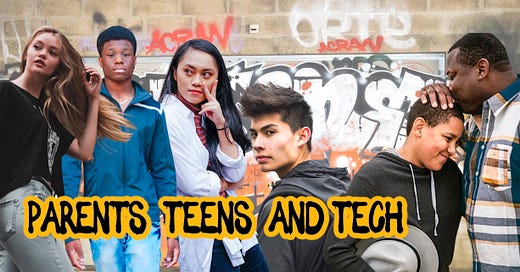Parents, Teens, And Tech
Over the past couple of weeks, I’ve been talking to parents about what they do and don't know about how their teens engage with media. The conversation often turns to social media and the often fearful sense that teens are wandering off into dangerous woods without the benefit of experience and parental guidance
Here are a few things I’ve learned:
Parents of teenage boys often begin the conversation with the precursor, “I’m lucky I have a good son.” However, later in the conversation, they admit that their son has a problem with telling the truth, doing schoolwork, sleeping, or, in some cases, viewing pornography. A number of them shared that their sons had casually suggested things like “life isn’t worth living” or “this is as far as I go.” But they work hard to keep lines of communication open and see these potential threats of suicidal ideation as not their greatest concern.
Talking to parents about teenage girls is very different. They talk about the dangers of so-called mean girls in a digital age, threats to body image, eating disorders, self-worth, and bullying. Fathers talk about daughters differently than mothers talk about daughters. One father said that fully half of his daughter’s friends are gender-“fluid,” creating new complexity about teen sleepovers and how to deal with the fact that some friends are dating each other and want to be invited to sleepovers.
All the parents I’ve spoken to are deeply conflicted about the government’s various attempts to protect teens. They’re paying attention to what they see is the likely federal government banning of TikTok, while at the same time, seeing it as dangerous and potentially impractical. They pay attention to legislative changes in Utah, but at least among my small group, parents see the idea of making it a parent’s responsibility to monitor and oversee their teen’s digital lives as impractical at best and dangerously in violation of basic freedoms that teens deserve as they grow and mature.
Interestingly, none of the parents I spoke to had any concerns about GPT-3 or AI. But two of them suggested that their teens had abandoned writing, instead narrating via voice-to-text for almost all their schoolwork. And a number of parents worried that their teens were considering abandoning college, pointing to billionaires who said college was a waste of time.
There’s definitely a conflict between what parents seem to agree is the right thing to do --taking phones away from teens before they go to bed so they can get a night's sleep -- and a number of teens who say they have trouble falling asleep without their phones. It's hard to say whether this is true or just an excuse to have their phones in bed until two in the morning.
I’ve heard time and time again how parents have no one to talk to, no place to get good advice, and no place to share stories. Talking to the parents of their teen's school friends seems invasive and potentially crosses the line of privacy for both their teens and themselves. Searching online for advice and guidance leads to mixed suggestions and posts, mostly from parents who had horrific experiences with their teens on social media.
Overall, parents feel a responsibility to their teens. As one said to me, “I go to bed at night scared and I wake up in the morning scared.” It's challenging to balance parental responsibility with teen freedoms in an era when platforms have adapted policies that amplify hate, misinformation, racism and antisemitism, all in the name of “free speech,” with little regard for the dangers their policies cause. One thing is clear: The platforms seem willing to put parents in the cross-hairs
.




